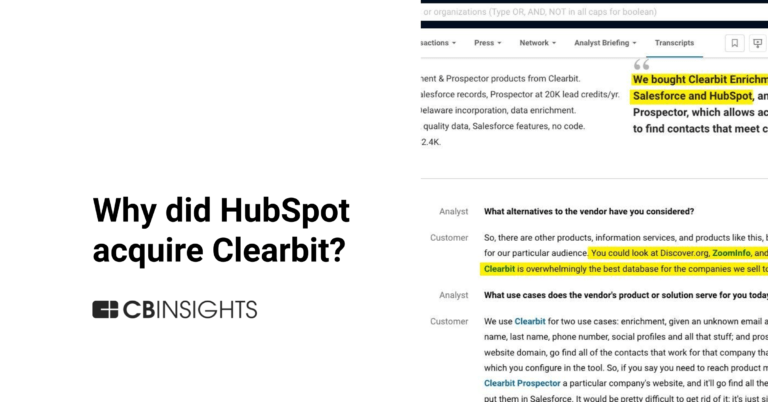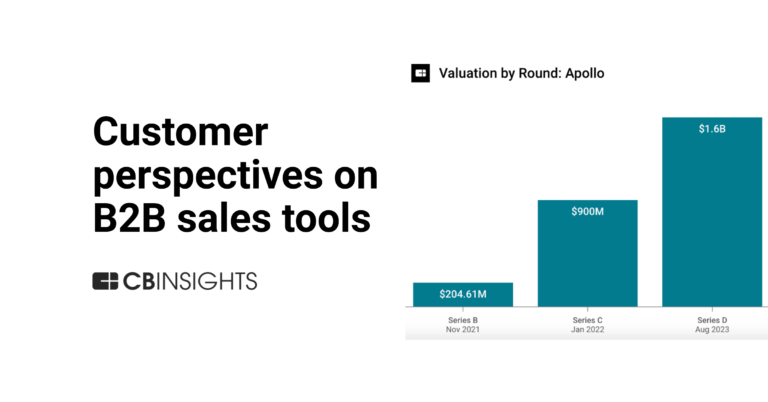
Apollo.io
Founded Year
2015Stage
Series D | AliveTotal Raised
$251.32MValuation
$0000Last Raised
$100M | 2 yrs agoMosaic Score The Mosaic Score is an algorithm that measures the overall financial health and market potential of private companies.
-34 points in the past 30 days
About Apollo.io
Apollo.io is a B2B sales platform trained on AI-powered sales automation in the sales technology industry. The company provides tools for contact and account search, sales engagement, inbound and outbound lead optimization, meeting and deal management, conversation intelligence, performance analytics, coaching, and CRM data enrichment and cleansing. It serves sales leaders, founders, account executives, marketers, sales development teams, and revenue operations professionals. It was founded in 2015 and is based in Covina, California.
Loading...
ESPs containing Apollo.io
The ESP matrix leverages data and analyst insight to identify and rank leading companies in a given technology landscape.
The B2B contact databases market offers valuable insights and connections for businesses aiming to enhance their outreach strategies. These databases compile comprehensive information about potential clients and partners, enabling targeted communication and relationship-building. Through advanced data aggregation techniques, these solutions ensure accuracy and up-to-date contact information. Busin…
Apollo.io named as Leader among 10 other companies, including Dun & Bradstreet, ZoomInfo, and Cognism.
Loading...
Research containing Apollo.io
Get data-driven expert analysis from the CB Insights Intelligence Unit.
CB Insights Intelligence Analysts have mentioned Apollo.io in 6 CB Insights research briefs, most recently on Jan 3, 2024.
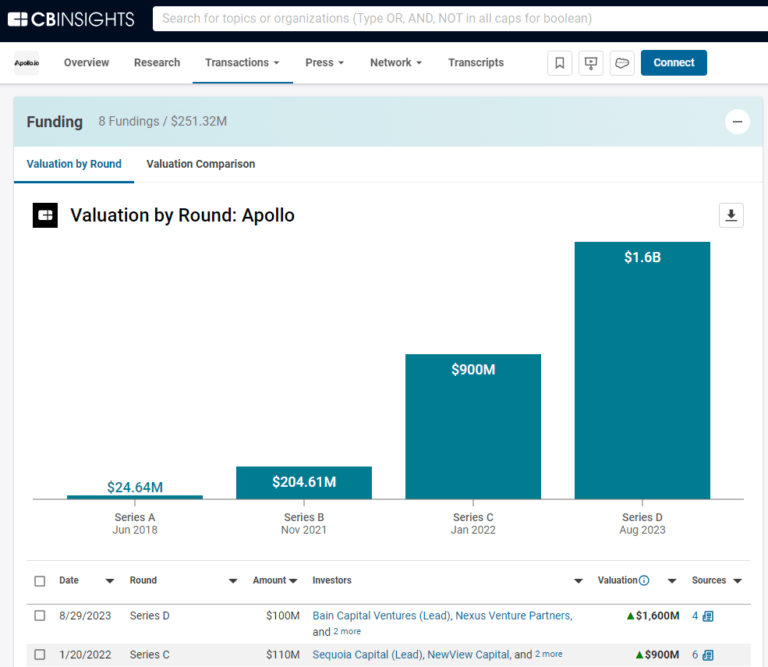
Jan 3, 2024
2024 prediction: Gong acquires Apollo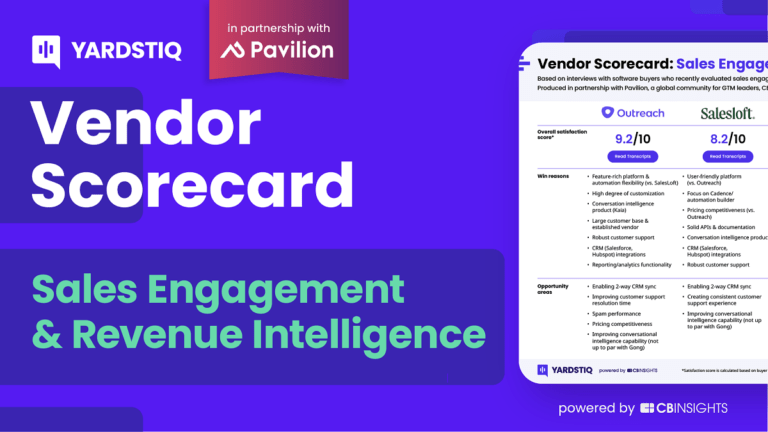

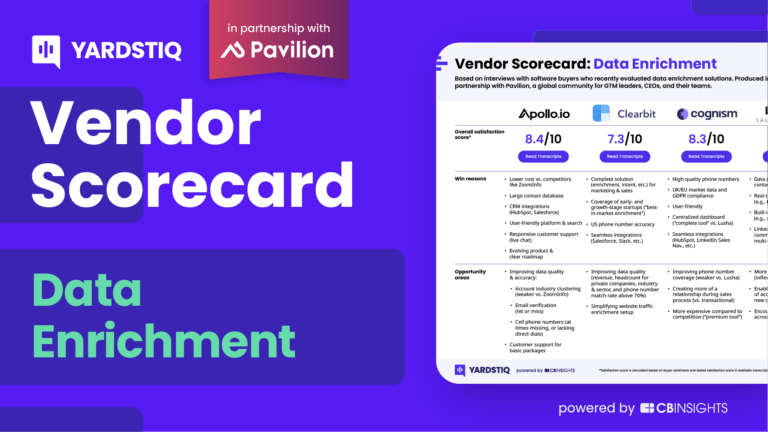
Apr 6, 2023 report
Top data enrichment companies — and why customers chose themExpert Collections containing Apollo.io
Expert Collections are analyst-curated lists that highlight the companies you need to know in the most important technology spaces.
Apollo.io is included in 2 Expert Collections, including Ad Tech.
Ad Tech
4,236 items
Companies offering tech-enabled marketing and advertising services.
Unicorns- Billion Dollar Startups
1,270 items
Apollo.io Patents
Apollo.io has filed 3 patents.
The 3 most popular patent topics include:
- digestive system procedures
- digestive system surgery
- electromagnetic radiation

Application Date | Grant Date | Title | Related Topics | Status |
|---|---|---|---|---|
12/20/2019 | 1/16/2024 | Neurophysiology, Electronic health records, Autonomic nervous system, Neuroscience, Sympathetic nervous system | Grant |
Application Date | 12/20/2019 |
|---|---|
Grant Date | 1/16/2024 |
Title | |
Related Topics | Neurophysiology, Electronic health records, Autonomic nervous system, Neuroscience, Sympathetic nervous system |
Status | Grant |
Latest Apollo.io News
Mar 26, 2025
_________ Hi Bela, what about being a CPO in today’s B2B Tech / SaaS market excites you? Thank you for having me on the SalesTech Interview Series! I recently joined Apollo.io as their new Chief Product Officer. Apollo is a leading AI sales platform anyone can use to find and engage leads, automate outreach, manage deals, and enrich data — all in one place. Before joining Apollo, I previously scaled product teams at Box (growing from ~$60M to $500M+ in ARR) and Iterable (growing from ~$40M to $200+M in ARR). In B2B SaaS, I find myself gravitating toward three things: building at scale, breaking through complexities with simple UX, and new tech frontiers. Apollo has all three! The scale of impact. Apollo supports over 500,000 companies including Stripe, ClickUp, Docusign, and Autodesk. We also support millions of sales professionals from startups and mid-sized businesses to global enterprises. The opportunities are endless. One of Apollo’s unique value adds is their simple and approachable UX. On G2 , Apollo is the No. 1 ranked best sales intelligence software for small business owners, earning rave reviews from customers. Apollo has changed the game on what is possible in sales intelligence. They recently introduced AI-powered features that help sales teams work smarter, not harder – like our contextual lead scoring that uses machine learning to prioritize the most promising prospects, and our intelligent outreach automation that adapts messaging based on real-time engagement data. While I can’t reveal all the details just yet, we’re preparing to launch some exciting new product innovations that will further transform how sales teams discover, engage, and convert leads. Our focus remains on solving real challenges for sales professionals by leveraging cutting-edge AI in practical, user-friendly ways. Can you share a few takeaways and learnings from your time scaling product workflows and teams in previous roles? The SaaS market is moving faster than ever. Take Cursor’s journey to $100M in ARR within a single year, which is a testament to how quickly the rules of engagement are changing. What once constituted a sustainable tech moat has become increasingly fragile. Traditional competitive advantages are eroding faster than ever, replaced by a brutal race of rapid innovation and customer-centric execution. Speed is no longer just an advantage, it’s survival. The paradox of growth is that as companies scale, organizational complexity and technical debt naturally decelerate innovation. The true differentiators are those rare organizations that can preserve their startup DNA—maintaining rapid iteration cycles while simultaneously establishing robust quality frameworks and strategic product decision-making processes. Customer obsession never gets old. Through every technological wave—from Cloud to Mobile to AI—the most successful product teams don’t just adapt to change, they anticipate and shape it. They don’t just listen to customers, they develop an almost telepathic understanding of unspoken needs and latent market possibilities. The emerging divide isn’t between those with AI and those without, but between companies that make AI native to their problem solving DNA versus those treating it as a superficial layer of innovation. The winning teams won’t boast about “AI roadmaps”—they’ll demonstrate AI as an intrinsic, transformative approach to understanding and solving complex challenges. What do you feel modern CPOs in enterprise tech need to focus on more as they build products to meet market needs amid rising competition? This brings me back to customer obsession, but with a critical nuance that many tech leaders miss. Enterprise tech has historically been a prisoner of anecdotal feedback—built on the squeaky wheel theory, where a handful of vocal customers dictate product direction. This approach is fundamentally broken. True innovation demands a more scientific approach: leveraging data science and structured research to understand the entire customer base at scale. It’s about listening and systematically decoding the latent needs across your entire user ecosystem. When it comes to sustainable competitive moats, UX and context are existential differentiators. I’ve watched UX become the silent dealmaker across every buying journey—from PLG startups to enterprise behemoths. G2 reviews, sales conversations, renewal rates—they all converge on one truth: experience is the new product. And in the AI era, we’re witnessing a radical UX transformation. We’re moving from static, “figure it out yourself” interfaces to dynamic, contextual, proactive interactions that anticipate user needs before they even articulate them. This isn’t a future state—it’s now. The companies that don’t invest in reimagining their user experience are already obsolete. It’s not just an upgrade cycle, it’s a fundamental reimagining of how software should interact with humans. The second critical moat is context. With LLMs being widely accessible, the real differentiation lies in the unique contextual intelligence each SaaS platform can provide. It’s not just about having data—it’s about transforming data into meaningful, actionable insights that create genuine competitive advantage. This is what attracted me to Apollo. Name a few ways in which you’ve been using AI to scale development cycles? AI tools for the development lifecycle are at an inflection point. Our early market data shows efficiency gains ranging from 30% to a 3x time compression. At Apollo, we’re using AI for engineering as well as reimagining how AI transforms every function. Being an AI-native company means AI isn’t a feature—it’s our operational nervous system. For Product, we are developing a comprehensive roadmap that goes far beyond conventional automation. We’re starting with foundational elements like intelligent notetaking, contextual content generation, research, and dynamic knowledge management. But here’s the real paradigm shift: these aren’t just productivity tools. They’re emerging co-workers with genuine cognitive capability. Product Managers have long wrestled with the execution-strategy paradox—how to simultaneously drive tactical progress while maintaining strategic vision. The recent leaps in AI mean we can now dissolve that false dichotomy. We are now creating AI agents that can genuinely collaborate, anticipate needs, and drive real outcomes. In addition to that, Product Operations is about to be completely re-architected where AI systems can orchestrate cross-company alignment, autonomously and proactively synthesize customer insights, intelligently structure review processes, proactively drive metric analysis, and so much more. The next 12 months will fundamentally rewrite how top teams operate. How do you envision new features and enhancements for Apollo.io products down the line? What can users expect? The future of Apollo is all about transformative AI-powered solutions that fundamentally reimagine sales efficiency and productivity. While I can’t reveal all the details just yet, I’m incredibly excited about what we’re preparing to unleash. We’re currently developing an AI agent builder that will give sales teams the ability to create intelligent, adaptive workflows that learn and optimize in real-time, waterfall enrichment for the most accurate and comprehensive contact information, a game-changing dialer, and a big announcement later this year. We’re completely rethinking how sales teams discover, engage, and convert leads. Our recent recognition by Forbes as one of America’s Best Startup Employers 2025 and winning the 2025 Gold Stevie® Award for Sales Technology Partner of the Year is a testament to our commitment to pushing the boundaries of what’s possible in sales tech, making it accessible and affordable to all. Name a few skills you feel everyone in product development should have today? Product managers should continue to sharpen traditional skills like storytelling, metrics craft, and cross-functional collaboration. Similarly for product designers, researchers and all builders alike I wouldn’t yet abandon the classical craft. Going further though, I advise to treat AI exploration as a mandatory survival skill. Experiment with all of the awesome innovations you can get your hands on. Discover and play with new UX interaction patterns, emerging jobs to be done or types of tasks to eliminate, experimenting relentlessly across technical and consumer AI products. How we build products, how we design; it’s all fundamentally changing and will continue to evolve rapidly. Those without exposure and hands-on experience will be left behind, no matter how excellent they might be at other parts of the craft.
Apollo.io Frequently Asked Questions (FAQ)
When was Apollo.io founded?
Apollo.io was founded in 2015.
Where is Apollo.io's headquarters?
Apollo.io's headquarters is located at 440 North Barranca Avenue, Covina.
What is Apollo.io's latest funding round?
Apollo.io's latest funding round is Series D.
How much did Apollo.io raise?
Apollo.io raised a total of $251.32M.
Who are the investors of Apollo.io?
Investors of Apollo.io include Nexus Venture Partners, Sequoia Capital, Tribe Capital, Bain Capital Ventures, NewView Capital and 9 more.
Who are Apollo.io's competitors?
Competitors of Apollo.io include Regie.ai, Clodura, RevenueBase, Cognism, Sales Marker and 7 more.
Loading...
Compare Apollo.io to Competitors

Cognism specializes in sales intelligence within the business-to-business data solutions industry. The company provides tools and services including phone-verified mobile numbers, validated business emails, and data enrichment to assist with lead generation and sales prospecting while ensuring compliance with regulations. It primarily serves the sales sector. The company was founded in 2015 and is based in London, United Kingdom.

Lusha is a B2B sales intelligence platform that provides tools for prospecting, data enrichment, and lead generation in various business sectors. The company's main offerings include a platform for building prospecting lists, enriching CRM data, and delivering buyer intent data and job change alerts. Lusha serves sales, marketing, revenue operations, and recruitment teams by supplying solutions that integrate with existing workflows. It was founded in 2016 and is based in Boston, Massachusetts.
Sales Marker provides a platform that analyzes web search behavior to identify companies with product or service needs, enabling targeted sales approaches. It primarily serves sectors that require targeting and engagement of potential clients with high purchase intent, such as technology and service industries. Sales Marker was formerly known as CrossBorder. The company was founded in 2021 and is based in Tokyo, Japan.

UserGems focuses on sales and marketing technology, enhancing pipeline generation through artificial intelligence (AI) and buying signal automation. The company offers products that capture buying signals and automate outreach processes, allowing teams to prioritize and engage with potential customers. UserGems serves sectors that require sales and marketing solutions, such as technology and professional services. It was founded in 2019 and is based in San Francisco, California.

Seamless.AI provides sales intelligence software for B2B lead generation. It offers a platform that allows for the search and validation of business contact information, helping sales teams connect with decision-makers. The company's services include CRM data enrichment, buyer intent analytics, job change alerts, and prospecting tools. It was founded in 2018 and is based in Columbus, Ohio.
Outbound is an internet company. It provides an artificial intelligence algorithms data and mining tools to gather, organize and validate contacts of decision-makers from their specific target market to automate the process of sales generation. The company is based in Dublin, Ireland.
Loading...

